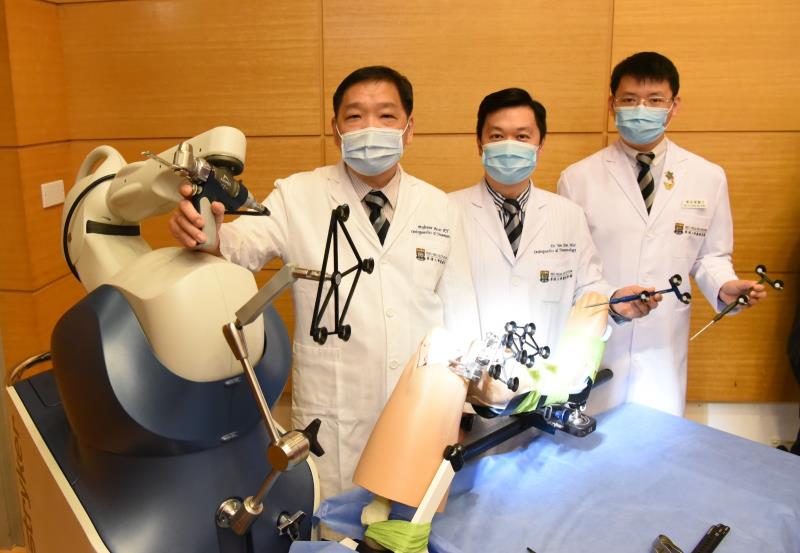
The University of Hong Kong (HKU) is the first to introduce the latest Mako system for robotic arm-assisted total hip replacement (THR), partial knee replacement (PKR) and total knee replacement (TKR) in public hospitals in Hong Kong. Early experience from January 2019 to May 2020 shows improvement in surgical precision and early functional recovery with the new technology.
“Short-term results of robotic arm-assisted joint replacement surgery are encouraging, showing improved accuracy and safety of operation, a reduced need for revision operations, and greater patient satisfaction. Overall, the learning curve for experienced surgeons is not steep. Further studies are required to assess long-term patient outcomes and cost-effectiveness of the new technique,” said Dr Chun-Hoi Yan of the Department of Orthopaedics and Traumatology, HKU.
As of 22 May 2020, 161 cases of robotic arm-assisted joint replacement surgery had been performed, including 79 cases of TKR, 35 cases of PKR, and 47 cases of THR. All patients achieved good rehabilitation progress without major complications.
Robotic arm-assisted THR demonstrated greater accuracy in implant position (98 percent vs 80 percent) compared with conventional THR. Evidence of early functional recovery with successful straight knee raise within 24 hours was demonstrated in all patients who underwent robotic arm-assisted TKR, with 84 percent being discharged directly from hospital. Superior joint line restitution was achieved with robotic arm-assisted PKR.
Currently, there are three certified trainers of robotic arm-assisted joint replacement surgery in Hong Kong, who are responsible for training local and regional surgeons. “An experienced joint replacement surgeon will be able to acquire the skills needed to operate the robotic system with a learning curve of only 10 cases. PKR was found to have a shorter learning curve and can thus be used as an excellent teaching tool for young surgical trainees,” said Yan.
The latest Mako robotic arm surgical system, acquired with a charitable donation from Tam Shiu Charitable Trust, is the only US FDA-approved system for TKA, UKA and THA. The three-dimensional CT surgical planning enables accuracy and specificity for patients, while bone removal under haptic control ensures soft tissue protection. Sizing and positioning of implants are also controlled by the robotic system.
Approximately 500 joint replacement surgeries are performed at Queen Mary Hospital each year. According to the HKU experts, >200 patients with severe deformities, undertaking primary operation or at a younger age would be able to receive robotic arm-assisted joint replacement surgery.